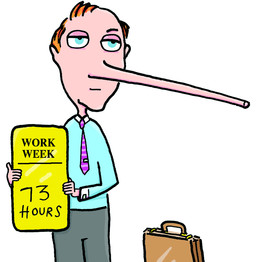
Source of caricature: online version of the WSJ article quoted and cited below.
(p. W13) Sociologists have been studying how Americans spend their time for decades. One camp favors a simple approach: if you want to know how many hours someone works, sleeps or vacuums, you ask him. Another camp sees a flaw in this method: People lie. We may not do so maliciously, but it’s tough to remember our exact workweek or average time spent dishwashing, and in the absence of concrete memories, we’re prone to lie in ways that don’t disappear into the randomness of thousands of answers. They actually skew results.
That’s the theory behind the American Time Use Survey, conducted annually by the Bureau of Labor Statistics. The ATUS, like a handful of previous academic surveys, is a “time diary” study. For these studies, researchers either walk respondents through the previous day, asking them what they did next and reminding them of the realities of time and physics, or in some cases giving them a diary to record the next day or week.
Time-diary studies are laborious, but in general they are more accurate. Aggregated, they paint a different picture of life than the quick-response surveys featured in the bulk of America’s press releases. For instance, the National Sleep Foundation claims that Americans sleep 6.7 hours (weekdays) to 7.1 hours (weekends) per night. The ATUS puts the average at 8.6 hours. The first number suggests rampant sleep deprivation. The latter? Happy campers.
The numbers are equally striking with work. Back in the 1990s, using 1985 data, researchers John Robinson and his colleagues compared people’s estimated workweeks with time-diary hours. They found that, on average, people claiming to work 40 to 44 hours per week were working 36.2 hours — not far off. But then, as estimated work hours rose, reality and perception diverged more sharply. You can guess in which direction. Those claiming to work 60- to 64-hour weeks actually averaged 44.2 hours. Those claiming 65- to 74-hour workweeks logged 52.8 hours, and those claiming workweeks of 75 hours or more worked, on average, 54.9 hours. I contacted Prof. Robinson recently to ask for an update. His 2006-07 comparisons were tighter — but, still, people claiming to work 60 to 69 hours per week clocked, on average, 52.6 hours, while those claiming 70-, 80-hour or greater weeks logged 58.8. As Mr. Robinson and co-author Geoffrey Godbey wrote in their 1997 book “Time for Life,” “only rare individuals put in more than a 55-60 hour workweek.”
For the full commentary, see:
LAURA VANDERKAM. “Overestimating Our Overworking.” Wall Street Journal (Sat., May 29, 2009): W13.
